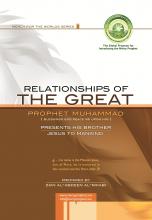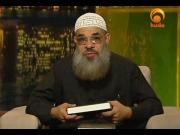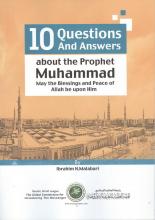The Prophet of Mercy Website
Muslim World League - Global Commission for Introducing the Messenger
Besides these, he had two concubines. The first was Mariyah, the Coptic (an Egyptian Christian), a present gift from Al-Muqauqis, vicegerent of Egypt — she gave birth to his son Ibrâhim, who died in Madinah while still a little child, on the 28th or 29th of Shawwal in the year 10 A.H., i.e. 27th January, 632 A.D. The second one was Raihanah bint Zaid An-Nadriyah or Quraziyah, a captive from Bani Quraiza. Some people say she was one of his wives. However, Ibn Al-Qaiyim gives more weight to the first version. Abu ‘Ubaidah spoke of two more concubines, Jameelah, a captive, and another one, a bondwoman granted to him by Zainab bint Jahsh.
Whosoever meditates on the life of the Messenger of Allâh (Peace be upon him), will conceive that his marriage to this great number of women in the late years of his lifetime, after he had almost spent thirty years of his best days of youth sufficing himself to one old wife — Khadijah and later on to Sawdah, was in no way an overwhelming lustful desire to be satisfied through such a number of wives. These marriages were in fact motivated by aims and purposes much more glorious and greater than what normal marriages usually aim at.
The tendency of the Messenger of Allâh (Peace be upon him) towards establishing a relationship by marriage with both Abu Bakr and ‘Umar and his marriage to ‘Aishah and Hafsah — and getting his daughter Fatimah married to ‘Ali bin Abi Talib, and the marriage of his two daughters, Ruqaiyah and Umm Kulthum to ‘Uthman — indicate clearly that he aimed at confirming the relationship among the four men — whose sacrifices and great achievements in the cause of Islam are well-known.
Besides this, there was that tradition of the Arabs to honour the in-law relations. For them a son or a daughter-in-law was a means by which they sought the consolidation of relationship and affection with various phratries. Hostility and fights against alliances and affinities would bring an unforgettable shame, disgrace and degradation to them.
By marrying the Mothers of believers, the Prophet (Peace be upon him) wanted to demolish or break down the Arab tribes’ enmity to Islam and extinguish their intense hatred. Umm Salamah was from Bani Makhzum — the clan of Abu Jahl and Khalid bin Al-Waleed. Her marriage to the Messenger of Allâh (Peace be upon him) produced good results. Khalid’s deliberately undecisive attitude at Uhud — for instance — was due to the Messenger’s marriage to Umm Salamah. Khalid went even further than that, in a short time he willingly became a keen obedient Muslim.
After the Messenger of Allâh’s marriage to Umm Habibah, Abu Sufyan, her father, did not encounter him with any sort of hostility. Similarly his marriage to Juwairiyah and Safiyah made the two tribes stop all sorts of provocation, aggression or hostility against Islam. Better still, Juwairiyah, herself, was one of the greatest sources of blessing to her own people. On the occasion of her marriage to the Prophet (Peace be upon him), his Companions set a hundred families of her people free. They said: “It is for their affinity with the Messenger of Allâh (Peace be upon him).” No need to say what great good impression this gratitude had on everybody’s soul. One of the greatest motives of all is Allâh’s bidding his Prophet to educate and purify the souls of people who had known nothing whatsoever about courtesy, education and culture. He had to teach them to comply with the necessities of civilization and to contribute to the solidification and the establishment of a new Islamic society.
An essential fundamental rule of the Muslim society is to prohibit mixing of men and women. Providing direct education for women, though highly compelling, is impossible in the light of this Islamic norm. Therefore, the Prophet (Peace be upon him) had to select some women of different ages and talents, and indoctrinate them systematically in order to educate she-bedouins and townswomen, old and young, and thus furnish them with the instruments of propagating the true faith. The Mothers of believers [i.e. wives of the Prophet (Peace be upon him)] were in such a convenient position that they could convey the state of the Prophet (Peace be upon him) and his affairs to people (men and women). Being educated and taught the teachings and rules of Islam, his wives, especially those who outlived him, played a very important role in conveying Prophetic traditions Ahadith to the Muslims. ‘Aishah, for instance, related a large number of the Prophet’s deeds and statements.
His marriage to his paternal cousin Zainab bint Jahsh was a peculiar case which aimed at eradicating a deeply rooted pre-Islamic tradition — i.e. the adoption of children. In Al-Jahiliyah the Arabs used to consider an adopted person exactly like a real son or daughter as far as rights and sanctities are concerned. That Jahiliyah tradition had been so deeply rooted in their hearts that it was not easy to remove or uproot it. This tradition in fact affronts the basic principles of Islam; especially those concerned with marriage, divorce and inheritance and some other cases, and brought about lots of corruptions and indecencies. Naturally Islam stands against such deeds, and attempts to remove them from the Islamic society.
For the eradication of this tradition, Allâh, the Exalted, bid His Messenger (Peace be upon him) to marry his cousin Zainab bint Jahsh, who was an ex-wife to Zaid. She was at variance with Zaid to an extent that he intended to divorce her — that was at the time when the Confederates (Al-Ahzab) were making an evil alliance against the Messenger of Allâh (Peace be upon him) and against the Muslims. The Messenger of Allâh (Peace be upon him) feared that the hypocrites, the idolaters, and the Jews would make a propaganda out of it and try to influence some Muslims of weak hearts. That was why he urged Zaid not to divorce her, in order not to get involved into that trial.
Undoubtedly this hesitation and partiality were alien to the character of the Prophet (Peace be upon him). They did not apply to the power of determination and will with which he had been sent. Allâh, the Exalted, blamed him for that by saying:
“And (remember) when you said to him [Zaid bin Haritha (May Allah be pleased with him) — the freed slave of the Prophet (Peace be upon him) ] on whom Allâh has bestowed grace (by guiding him to Islam) and you [O Muhammad (Peace be upon him) ] have done favour (by manumitting him), ‘Keep your wife to yourself, and fear Allâh.’ But you did hide in yourself (i.e. what Allâh has already made known to you that He will give her to you in marriage) that which Allâh will make manifest, you did fear the people [i.e. Muhammad (Peace be upon him) ] married the divorced wife of his manumitted slave] whereas Allâh had a better right that you should fear him.” [33:37]
Finally Zaid divorced Zainab and the Messenger of Allâh (Peace be upon him) married her at the time he laid siege to Bani Quraiza. That was after she had finished her Iddat (i.e. period during which a widow or a divorcee may not remarry). Allâh Himself had already ordained it, and so gave him no other alternative. Allâh had even started the marriage Himself by saying:
“So when Zaid had accomplished his desire from her (i.e. divorced her), We gave her to you in marriage, so that (in future) there may be no difficulty to the believers in respect of (the marriage of) the wives of their adopted sons when the latter have no desire to keep them (i.e. they have divorced them).” [33:37]
And that was in order to break down the tradition of child adoption in practice after He had done it in words:
“Call them (adopted sons) by (the names of) their fathers, that is more just near Allâh.” [33:5]
“Muhammad (Peace be upon him) ] is not the father of any man among you, but he is the Messenger of Allâh, and the last (end) of the Prophets.” [33:40]
Lots of deeply-rooted traditions cannot be uprooted or demolished or even adjusted by mere words. They must be matched and associated with the action of the advocate of the Message himself.
******







